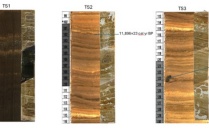Investigation of Red Pond Thin Sections
By Grace Maxon, University at Buffalo
Advisors: Jason Briner, earth science, University at Buffalo
Project Objectives
•Red Pond is a kettle lake in Western New York that may be useful for understanding past environmental changes, which can help us predict the effect of modern climate change
•My project: Using thin sections to characterize sediment from before and after the end of the Younger Dryas, and determining if sediment layers are annual
Data and Results
• Made 9 thin sections, 3 from upper organic sediment and 6 from lower inorganic sediment
• Upper sediment may have annual layers, lower sediment less distinct
• Difficult to interpret without further research
Significance
• If the organic sediment records individual years, we could get a very high-resolution record of environmental change through time
• Future work: more thin sections, investigate mechanisms influencing sediment deposition, compare to modern lake processes
Publication or Conference
Presented at the Climate and Geohazards REU Symposium, potential for conference presentation in the future.
------------------------------------------------------------------------------------------------
Center for Geological and Climate Hazards
Interdisciplinary Research Experience for Undergraduates in Atmospheric and Geological Hazards

Illustration of a simple neural network, where the inputs include AOD, emissions, and winds, and the output is the change of AOD to the next time step.